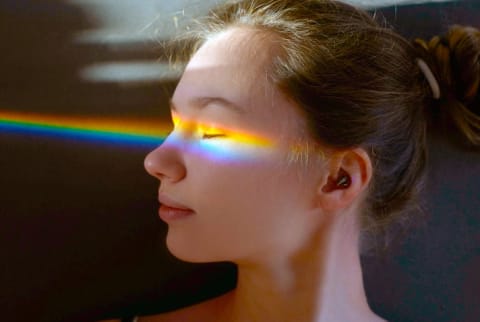Advertisement
New Study Reveals 3 Surprising Health Effects Of Light Exposure During Sleep


Whether you sleep with a night light, keep the TV on, or live in a well-lit urban neighborhood, it's not uncommon to have ambient light while you sleep. But according to a new study published in the journal Proceedings of the National Academy of Sciences, sleeping with lights on may affect sleep and interestingly, cardiometabolic health, more than we realize. Given our nation has a real issue with metabolic health, this sleep research has major implications. Here's what researchers found.
Studying the impact of bedroom lighting.
For this study, researchers wanted to find out how exposure to light during sleep would affect participants. They had 20 young adults take part in the study that lasted for two nights.
One group of 10 participants slept in a room with dim light on the first night, then with overhead lighting on the second night. The other half of the participants had two nights of dim light while they slept.
Then, the researchers looked at the participants' glucose and insulin levels, melatonin levels, brain waves, plus heart rate, and heart rate variability.
What they found.
Based on the findings, it would appear having too much light in the bedroom while you sleep is no good for three key factors: heart rate, heart rate variability, and insulin sensitivity (which has implications for blood sugar balance).
Compared to the participants who slept in dim lighting, those who slept with overhead lighting spent more time in stage two sleep and less in REM and slow-wave sleep—which is essential for rest and recovery. The group with light disrupting their sleep also experienced higher insulin levels in their blood and less insulin sensitivity in the morning.
Additionally, compared to the dim lighting group, those who slept with overhead lighting experienced a higher heart rate and lower heart rate variability, which the study authors believe is related to the nervous system. As study co-author Daniela Grimaldi, Ph.D., explains in a news release, "We showed your heart rate increases when you sleep in a moderately lit room. Even though you are asleep, your autonomic nervous system is activated." She notes that typically, heart rate is meant to be lower at night and higher during the day.
And as senior study author Phyllis Zee, Ph.D., adds, "It's important for people to avoid or minimize the amount of light exposure during sleep. These findings are important, particularly for those living in modern societies where exposure to indoor and outdoor nighttime light is increasingly widespread."
"Given that these shocking results were observed after just one night of light-disrupted sleep, it makes you wonder how pivotal optimizing lighting and other sleep hygiene practices over the long term can be for our health as a nation," concludes mbg's vice president of scientific affairs, Ashley Jordan Ferira, Ph.D., RDN.
The takeaway.
If you're someone who keeps the TV on while you sleep, or your window faces a big streetlight, it might be time to adjust accordingly. Whether that means investing in some blackout curtains or an eye mask, or learning how to fall asleep without a night light, your sleep and cardiometabolic health may be better for it.
